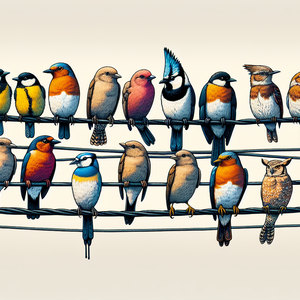The Gig Economy Boom: Jobs That Took Center Stage in 2020

In 2020, several gig economy platforms saw explosive growth as people turned to freelance and short-term work to replace lost income. Major players like Uber, Lyft, DoorDash, and Fiverr became household names, enabling individuals to leverage their skills or assets to earn money on their own terms. For instance, DoorDash reported a 200% increase in orders during the pandemic, as consumers opted for food delivery over dining out, allowing drivers to capitalize on this newfound demand. Platforms like Upwork and Freelancer provided freelancers with opportunities to utilize their skills in writing, graphic design, and programming, among other fields. These platforms catered to both individuals looking for work and businesses seeking flexible labor solutions, thus becoming essential in a rapidly changing job market. According to research conducted by Statista, the number of gig workers in the U.S. increased significantly, with a notable rise in those engaging in freelance work as a primary source of income.
Types of Jobs That Gained Traction
As the pandemic reshaped consumer behavior, certain types of gig jobs surged in popularity. Delivery services became a lifeline for many, as people sought safe alternatives to shopping in physical stores. Delivery drivers, grocery shoppers, and food couriers found ample opportunities to earn income while adhering to social distancing guidelines. Reports indicated that the demand for grocery delivery services surged by 50% during the early months of the pandemic, reflecting a shift in consumer preferences. Simultaneously, the demand for online services skyrocketed. With more businesses shifting to digital platforms, roles such as virtual assistants, online tutors, and social media managers became increasingly sought after. For example, online tutoring platforms like VIPKid experienced a significant uptick in demand, as parents sought educational support for their children during remote learning. According to a survey by Education Week, 61% of parents reported using online tutoring services during the pandemic, showcasing the necessity of these gig roles in the education sector. Additionally, creative fields flourished within the gig economy. Content creators, graphic designers, and digital marketers found themselves in high demand as brands sought to enhance their online presence.
Reshaping Employment Perceptions
The gig economy's growth in 2020 has not only provided flexibility but has also altered the perception of work itself. Traditionally, job stability and long-term employment were viewed as hallmarks of success. However, the pandemic forced many to reconsider these ideals. The flexibility and autonomy offered by gig work became appealing, particularly for those who prioritized work-life balance or sought to supplement their income. A survey by McKinsey found that nearly 20% of U.S. workers engaged in gig work during 2020, with many citing the desire for greater control over their schedules and work environments. Moreover, the gig economy has blurred the lines between traditional employment and freelance work. Many individuals have embraced the idea of portfolio careers, where they juggle multiple gig jobs to create a diverse income stream. This shift has led to a growing acceptance of non-traditional work arrangements, challenging the conventional 9-to-5 job model. Freelancers reported feeling more empowered in their careers, as they could choose projects that aligned with their interests and skills.
The gig economy boom in 2020 has transformed the way we view work and employment. As individuals sought alternative income sources in the face of economic uncertainty, gig platforms and flexible job opportunities emerged as viable solutions. From delivery drivers to virtual assistants and content creators, the rise of gig work has reshaped the labor landscape, offering newfound autonomy and flexibility. As we look to the future, it is clear that the gig economy is not merely a temporary fix but a lasting shift in how we engage with work, paving the way for a more diverse and adaptable workforce. The changes brought about by the pandemic have solidified the gig economy as a cornerstone of modern employment, encouraging both individuals and businesses to rethink their approaches to work.
Gig Delivery Driver
Uber Eats, DoorDash, Instacart
Core Responsibilities
Deliver food and groceries to customers using personal or company-provided vehicles.
Navigate efficiently to ensure timely deliveries while adhering to safety protocols.
Communicate with customers to provide updates on delivery status and resolve any issues.
Required Skills
Strong time-management skills to handle multiple deliveries efficiently.
Excellent communication and customer service skills.
Familiarity with navigation apps and local traffic regulations.
Virtual Assistant
Upwork, Freelancer, Belay Solutions
Core Responsibilities
Provide administrative support to businesses or entrepreneurs, including managing emails, scheduling appointments, and handling customer inquiries.
Assist in data entry, research, and project management tasks.
Create and maintain organized filing systems and documentation.
Required Skills
Proficiency in office software (e.g., Microsoft Office, Google Workspace) and communication tools (e.g., Zoom, Slack).
Strong organizational skills and attention to detail.
Ability to work independently and manage multiple tasks.
Online Tutor
VIPKid, Tutor.com, Chegg Tutors
Core Responsibilities
Deliver tailored educational support to students in subjects ranging from math to languages through virtual platforms.
Develop lesson plans and instructional materials based on individual learning needs.
Assess student progress and provide constructive feedback to enhance learning outcomes.
Required Skills
Expertise in specific subject areas, often requiring a teaching certification or relevant degree.
Strong communication skills to explain concepts clearly and engage students.
Familiarity with online teaching tools (e.g., Zoom, Google Classroom).
Freelance Graphic Designer
99designs, Fiverr, Upwork
Core Responsibilities
Create visual concepts for branding, marketing materials, and digital content for clients.
Collaborate with clients to understand their vision and deliver designs that meet their requirements.
Revise designs based on client feedback and ensure final products are delivered on time.
Required Skills
Proficiency in design software such as Adobe Creative Suite (Photoshop, Illustrator, InDesign).
Strong portfolio showcasing previous design work and creative skills.
Ability to manage multiple projects and adhere to deadlines.
Social Media Manager
Marketing agencies, startups, and brands across various industries
Core Responsibilities
Develop and implement social media strategies to increase brand awareness and engagement across various platforms.
Create and curate content, including posts, images, and videos, tailored to specific audiences.
Analyze performance metrics and adjust strategies to optimize reach and effectiveness.
Required Skills
Strong understanding of social media platforms and trends.
Excellent writing and communication skills for creating compelling content.
Familiarity with social media management tools (e.g., Hootsuite, Buffer) and analytics software.


